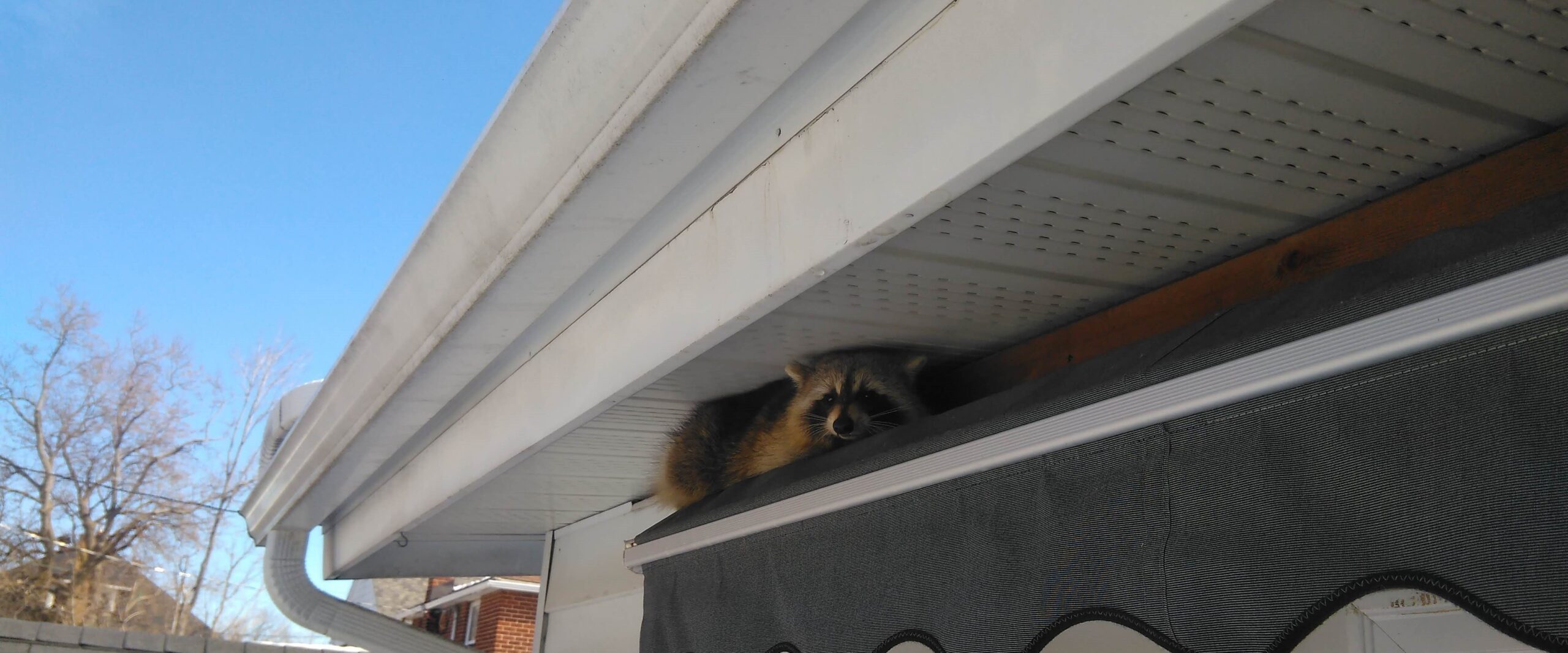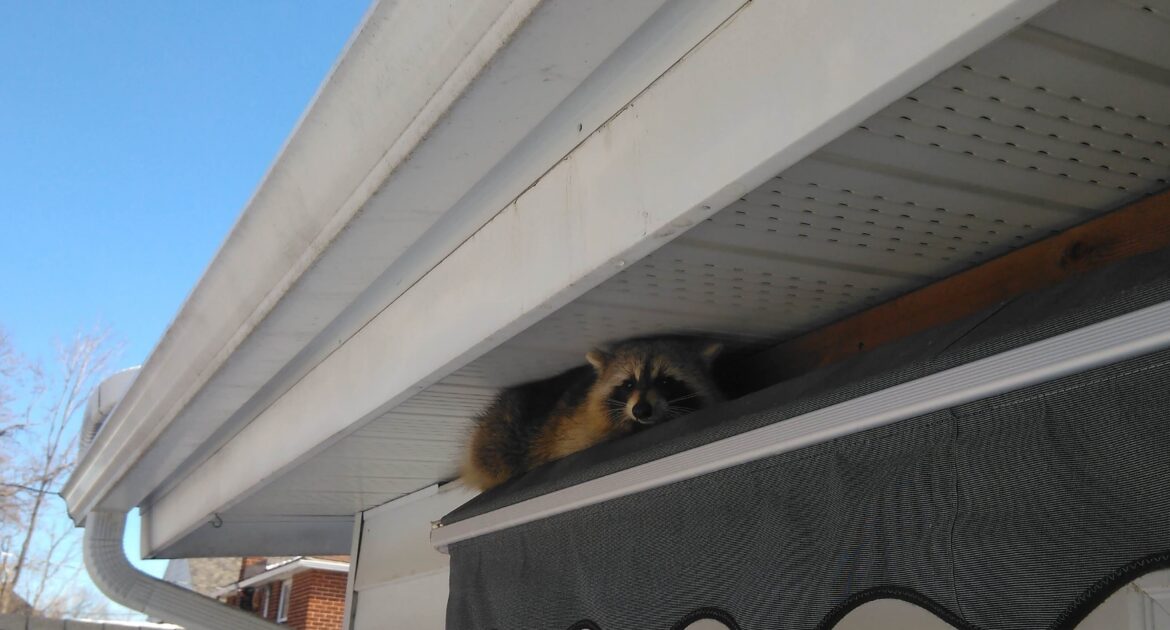Hearing strange sounds at night is normal in a noisy building. But what if those bumps and scratches aren’t from your neighbours? Many renters are shocked to discover they’ve got unexpected houseguests. When it comes to raccoons in rental properties, a cozy apartment can quickly become a major concern.
This isn’t just an awkward situation—it’s a real threat to your health and your home. In fact, one B.C. renter woke up to raccoon urine dripping from the ceiling. That’s not just messy—it’s hazardous. In this guide, we’ll show tenants and landlords in Port Moody what to do if wildlife moves in. We’ll cover the signs, the risks, and the right steps for a safe, humane solution.
Spotting the Problem: Clues You Might Have Company
You might not see wildlife right away—but you often hear or smell them first. Animals in the ceiling or walls can be noisy, messy, and destructive. Figuring out what’s happening is the first step in handling raccoons in rental properties.
Watch for these common signs:
- Noises: Raccoons are active at night. Listen for scratching, scampering, or thumping above your head or behind the walls. Their “chittering” and purring are dead giveaways.
- Strange Stains or Odours: Brown spots on the ceiling or a musty smell in a specific area? That could mean animal urine leaking through or waste building up in hidden spots.
- Damage Outside: Torn roof vents, holes in soffits, or pulled-back shingles can be a raccoon’s way into the building.
- Droppings and Nesting: Inside, you might come across droppings or see collections of shredded insulation used for nests.
Pay attention—a recent survey found that nearly 20% of Port Moody renters have dealt with wildlife in their home. Often, the animals arrive unnoticed until the signs are loud and clear.
The Risks Go Beyond Noise: Real Threats to Safety
Raccoons and other animals wandering into homes aren’t just a frustration. They can threaten both your safety and the property itself. Thousands of renters across Canada face expensive clean-ups every year after wildlife moves in. The best step is to act fast before the problem grows.
Here’s what’s at stake:
Structural Problems:
- Raccoons tear up insulation for warm nests. This can lead to heat loss and higher utility bills.
- They often chew electrical wires, which is a serious fire risk. Some estimates suggest that 1 in 5 “mystery” house fires may be caused by wildlife damage.
- Over time, activity in the ceiling weakens drywall, beams, and even ventilation systems.
Health Hazards:
- Droppings from raccoons may contain deadly roundworm eggs. If these are breathed in or accidentally swallowed, it can cause permanent health problems.
- Urine soaks into wood and drywall. This causes mould to grow and materials to rot.
- Animals bring fleas, ticks, or other parasites easily spread to people and pets.
A government study found nearly 60% of urban raccoons in B.C. carried parasites dangerous to people. That’s just another reason to take these issues seriously.
Raccoons in Rental Properties: Who’s Responsible?
When animals show up, it’s easy for tenants and landlords to feel tense or unsure. There can be confusion over whose job it is to fix the issue and how to start. Knowing your rights and responsibilities can make the situation much less stressful.
What Should Tenants Do?
If you think there’s wildlife in your rental, take these steps right away:
- Notify Your Landlord: Contact them immediately. Send an email or written message with details about the sounds, smells, or damages, creating a record of your report.
- Document What You See: Take clear photos of damage or stains. Keep a log of when and where noises occur—this helps the professionals later.
- Stay Safe: Never try DIY removal or block entry points. Wildlife is unpredictable, and certain species can be aggressive or carry diseases.
Remember, about 70% of wildlife entries happen through small, hidden gaps most people don’t notice. It’s easy to miss the early signs if you’re not regularly inspecting your home.
What Are Landlords Responsible For?
Landlords have a legal duty to keep rental units in good repair. That includes dealing with wildlife. Failing to act can lead to costly repairs—and potential liability if someone gets hurt.
- Respond Quickly: Start investigating as soon as you hear from your tenant. Delays let the problem get worse.
- Bring in the Pros: Don’t ask a handyman to “just patch the hole.” Professional companies specializing in humane wildlife control know how to safely remove animals and prevent re-entry. This is the only way to handle jobs like ceiling raccoon removal correctly.
- Cover Repairs and Prevention: After removal, it’s the landlord’s responsibility to repair damage and secure the building.
Securing professional help is also crucial because in many provinces, the law requires the most humane solution possible. That means prioritizing animal well-being as well as tenant safety.
Why Only Qualified, Humane Wildlife Control Works
You may be tempted to try a quick solution. But blocking holes or laying traps can make things worse. There are stories of homeowners sealing off a gap, only to have animals die inside, leaving an even bigger problem. Or, a mother animal might cause serious destruction trying to reach her young.
Trying DIY also brings tenant liability risk. If someone’s hurt or animals are inhumanely treated, the costs can explode. That’s why every expert says professional help is essential when faced with tenant wildlife control issues.
What happens when you call in a company like Skedaddle?
- Full-Property Inspection: Trained technicians check every potential entry point and hidden space, using decades of experience to understand animal behaviour.
- Humane Removal: With techniques like one-way doors, professionals allow wildlife to exit on its own. That prevents separation of young from parents and reduces stress for everyone involved.
- Deep Cleaning and Repairs: Pros will decontaminate the area, remove droppings, replace soiled insulation, and prevent mould.
- Permanent Prevention: All entry points are sealed with tough materials, not just a patch. This ensures animals cannot return.
Bulletproof prevention is critical—studies show that 80% of homes will face another issue within three years if entry points aren’t professionally sealed.
Restoring Comfort and Security
After the process, life gets back to normal. Repairs are made, dangerous droppings are removed, and your home feels safe once again. For tenants, that means peaceful nights—no more scratching above your sleeping head. For landlords, it means investing in the property’s future, avoiding repeated hassles and big repair bills.
Whenever you reclaim your home after a wildlife intrusion, make these closing steps part of your routine:
- Replace Damaged Materials: Ceiling, insulation, and drywall may need to be swapped for safety and comfort.
- Air Out the Space: Sometimes smells linger. A professional cleaning helps restore fresh air.
- Monitor for New Activity: Continue checking for new signs every few months, especially during early spring when most urban wildlife seeks out warm spots.
Preventative maintenance makes all the difference. Prevention statistics show that thorough sealing keeps 90% of properties wildlife-free for five years or more, compared to just 40% for homes with only basic repairs.
Don’t Delay: Take Action Against Wildlife Intruders
No one should accept living with wildlife in their rental. Issues like raccoons in rental properties pose health, comfort, and safety risks to everyone inside. If you hear suspicious sounds or notice damage, don’t wait.
For tenants and landlords alike:
- Act fast
- Contact a trusted wildlife control company
- Protect your home and your health
Expert companies in Port Moody will always use the most ethical and effective solutions. With proper ceiling raccoon removal and prevention, you’ll enjoy comfort and peace of mind once again. Tackle tenant wildlife control issues head on—with transparency, communication, and support from the professionals who care.
For safe, humane wildlife removal, contact Skedaddle Humane Wildlife Control today. Your home deserves the best protection—let us help you reclaim it for good.




